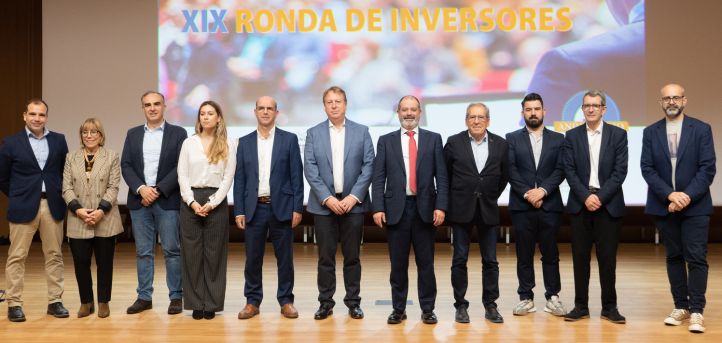The Fundación Innovación y Desarrollo (Innovation and Development Foundation, FIDBAN), established by the Universidad Europea del Atlántico (European University of the Atlantic), the Iberoamerican University Foundation (FUNIBER), Sodercan – Government of Cantabria, as well as the Technological Center CITICAN, with the significant participation of the municipalities of Santander and Torrelavega, and the CEOE-CEPYME, has welcomed in its nineteenth Round of Investors two innovative proposals with national projection that want to take off from Cantabria. The startups Neptune Energy Services, which has presented a proposal to decarbonize Spanish ports; and UltraVirtus, which has presented designs for military equipment based on disruptive technologies.
Ports in Spain face the challenge of adopting sustainable energy practices, such as achieving 50% renewable self-generation and drastically reducing their carbon footprint by 70% in accordance with the regulations and goals established by the European Union and the Spanish Government. This is the problem that the Neptune Energy Services startup is tackling. Its founders, Teodoro Nogueras and Alberto Pontarolo, presented their solutions, which they said, “are neither easy nor universal,” but which have in wave energy, the energy of waves, a viable option for those ports exposed to waves —119 in Spain—, being a resource that does not take up space in their activity and is renewable, inexhaustible, and predictable. The solution proposed by Neptune Energy Services has all the possibilities to become one of the pioneers in this market, positioning itself as a leader in decarbonization with the generation through modular wave energy installations attached to the breakwaters, participating in the value chain from promotion, subsidy management, and construction to the operation and maintenance of the installations, including the sale of energy.
The proposed business model, defended before the investors who responded to FIDBAN’s call, is based on agreements with the ports in the form of energy services, which facilitates investment and operation, providing flexibility adapted to each situation. We are also seeking a strategic partnership for the development of modular and high-performance equipment with a technological partner with a recognized track record in the naval and marine energy sector. The chosen technological partner is the Cantabrian company Degima.
Neptune Energy Services has a medium-term objective (2026) to build three facilities in areas with high energy volume (northern coast of Spain) with a combined capacity of 1 MW and 7.1 GWh/year generated. The associated investment is €7.8 million, comprised partly in Next Generation funds, under specific lines of the IDAE’s ResMarinas program, and partly in external financing (€2.16 million), providing an estimated return of 15% and a payback in 7 years.
Military prototypes
Mario Ceballos, CEO of UltraVirtus, presented the development of his startup, conceived based on disruptive technologies in the field of robotics, bionics, UAVs, and electrification. Together with their partner, Colonel Cerrato, they have carried out the design, manufacture, commissioning, and comprehensive service of products and services that have a dual focus, both military and civilian.
Its first prototype, Ultra Exo-1, designed with light infantry in mind, was created with the aim of increasing the soldier’s capabilities. Ultra Exo-1 is an active exoskeleton that incorporates servomotors, control board with AI capability, sensors, and batteries as needed, all ruggedized, easy to install, and maintain. Focused on the lower part of the fighter, it increases strength and endurance. The manufacturing is additive powder-based, with PA12 polyamide together with carbon fiber, which reduces weight and increases hardness. They have a simple positioning and lashing system, leaving a wide degree of mobility to the fighter.
Ceballos pointed out that special emphasis has been placed on the ergonomics of the exoskeleton in the design of the prototype to make it as comfortable as possible, avoiding possible friction points that cause discomfort. It is configurable in height and can be used by people from 1.60 cm to 1.90 cm.
UltraVirtus has other equally innovative developments in the pipeline. It is currently implementing the SISCAP Program, a foot combatant system, together with INDRA. Also in the works is Ultra Exo-2 for mechanized infantry. An active full-body exoskeleton. Based on the Ultra Exo-I, the upper part is added to provide increased capabilities over almost the entire body.
A robotic suit manned by an immersive operator based on the Ultra Exo-I, AI drones capable of responding jointly to one or more leaders who mark the actions, or a medium-altitude, long-range (MALE) unmanned aerial vehicle (UAV) are some of the projects Ultra Virtus is currently working on.
The round of investors was opened by Alejandro Trigos, founder of CIFRA Educación (CIFRA Education) and experienced entrepreneur, who was interviewed by Fermín Mier, content director of Cadena SER in Cantabria.
FIDBAN, a member of the Asociación Española de Business Angels (Spanish Association of Business Angels, AEBAN), has made it possible for more than 70 entrepreneurial projects, mostly from Cantabria, to present their projects in search of funding. Founded in 2017, in addition to the investor rounds held in Cantabria, FIDBAN has taken its activity to Guatemala, El Salvador, and Mexico.


